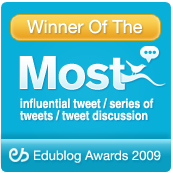A few years back I spoke at a conference and experienced first hand what a backchannel was. Twitter is probably the best tool to do it. I did write a post on that experience back in November of 2009 and later reposted on my blog, Twitter’s Effect on Presentations and Presenters.
Backchanneling happens when someone on Twitter uses a hashtag to tweet out to followers what is happening at a conference, or more importantly, what is being said by a speaker at a conference session. THE BACKCHANNEL by Cliff Atkinson is a great book source for understanding the process.
ISTE 2014 will take place at the end of this week. The numbers of attendees will probably approach 20,000. Although that sounds like a huge number of people, it only represents a very tiny number of educators nationwide who get to attend such national education conferences. The attendance of connected educators however, has had a great effect on the transparency and sharing of these gigantic education events through social media, specifically, Twitter.
The Twitter Hashtag has played a huge role in sharing out the conference experience. Since most educators will not be attending the ISTE 2014 conference, many who are connected will rely on their connected colleagues, who will attend, to tweet out the happenings of the event. Those tweets will go from the broad events to individual sessions as well. Although ISTE 2014 is one of the most connected of education conferences, backchanneling is becoming evident at even the smaller local education gatherings. It is a key in sharing at local Edcamps
Conferences have taken notice of this new layer of experience and assign hashtags for the conference, as well as some specific sessions. Experienced connected educators in sessions will make up and share a hashtag on the spot at the beginning of the session. To broadly follow the ISTE conference this year, you need only to create a Twitter column on Tweetdeck or Hootsuite to follow the #ISTE2014 hashtag. There will be several thousand tweets coming out with that hashtag to keep you informed of: personal encounters, celebrity sightings, quotes, new ideas, new products, and even social events taking place. There will be pictures, videos, podcasts, diagrams and graphs. All will be tweeted out with the Hashtag #ISTE2014.
Probably the most sought-after tweets will be those coming directly from sessions. Thought leaders in education presenting their ideas and having people right in the room tweet out what is being said, as it is being said. This is sharing at its best. If the vast majority of educators cannot experience an education conference first hand this is not a bad second best.
As a community of connected educators we need to think of our Personal Learning Network members as connected colleagues. Those educators fortunate enough to have any experiences that cannot be afforded to all, and are willing to take the time to share, are truly collaborative colleagues. These hashtagged tweets have a range in the millions. That is a Public Relations Gold for any organization with a success.
Of course there is a downside. If something does not go well, that is tweeted out as well. It could also be a professional setback for an unprepared presenter. The Twitter Backchannel Buzz could affect the subsequent enthusiasm for any future conference by a particular group. It also underscores those conferences that are attended by the connected community of educators.
I have always believed that we as educators have a professional and moral obligation to share. In so doing, we can build a stronger and better profession of educators. If you have never done it, try following the backchannel for this year’s ISTE Conference by following the #ISTE2014 hashtag. If you attend the ISTE Conference, tweet out as much important stuff as you encounter using the #ISTE2014 hashtag. We can engage fellow educators in the conferences, which they have been blocked from because of location, money, or even an unawareness of what these conferences have to offer. If we are to better educate our kids, we need to better educate their educators.











